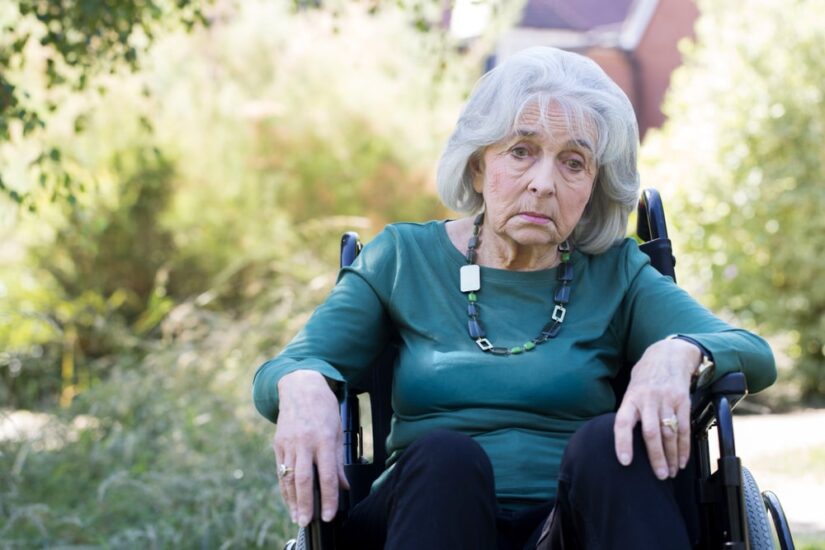What are the Signs of Nursing Home Neglect?
Identifying signs of nursing home neglect is necessary to ensure the well-being of your loved ones in Illinois nursing homes. Recognizing these indicators early can help address issues and protect residents from harm.

Warning Signs of Nursing Home Neglect in Illinois
- Poor Personal Hygiene: Neglect may manifest in residents experiencing inadequate assistance with personal hygiene, resulting in unkempt appearances, dirty clothing, or unaddressed grooming needs.
- Malnutrition and Dehydration: Insufficient attention to residents’ dietary needs can lead to malnutrition or dehydration. Signs include unexplained weight loss, dry skin, or signs of thirst.
- Untreated Medical Conditions: Neglect or elder abuse may be evident when medical conditions go unaddressed. Untreated infections, wounds, or other health issues indicate a lack of proper medical care.
- Inadequate Supervision: Nursing home residents who require supervision and assistance may be left unattended, leading to accidents, falls, or injuries. Lack of supervision compromises resident safety.
- Bedsores or Pressure Ulcers: Prolonged immobility without proper care can result in the development of bedsores or pressure ulcers. These indicate neglect in turning and repositioning residents regularly.
- Environmental Hazards: Neglect may be evident in unsafe living conditions. Clutter, poor lighting, or lack of maintenance contribute to an environment that poses risks to residents.
- Emotional Changes: Neglect can impact residents emotionally. Withdrawal, depression, or anxiety may indicate a lack of social interaction, emotional support, or mental health care.
- Lack of Assistance with Mobility: Residents who require assistance with mobility but are left without support from the nursing home staff members may suffer falls, fractures, or other injuries due to neglect.
- Unsanitary Living Conditions: Nursing home neglect is apparent when nursing home environments are consistently unclean, with soiled bedding, dirty facilities, or unhygienic conditions.
- Social Isolation: Residents may be neglected if they lack opportunities for social interaction, activities, or engagement with others, leading to feelings of isolation.
- Delayed Responses to Requests or Emergencies: Nursing home abuse or neglect is possible when staff consistently fails to respond promptly to residents’ requests for assistance or emergencies.
- Unexplained Financial Transactions: In cases of financial neglect, unauthorized or unexplained transactions involving a resident’s finances may occur.
- Unexplained Injuries: Frequent unexplained injuries, bruises, or fractures may be indicative of neglect or abuse within the nursing home.
- Lack of Proper Care Planning: Neglect is apparent when there is a lack of individualized care plans for residents, addressing their unique needs and preferences.
Family members should be vigilant to the signs of nursing home neglect. You should report nursing home neglect or suspected physical harm or emotional abuse of nursing home facilities to adult protective services, state or national center agencies for elderly residents, or the World Health Organization is important.
Experienced nursing home abuse lawyers in Illinois can help your loved one recover financial compensation from the assisted living facilities and individuals for nursing home abuse, elder abuse, or medical neglect.
Steps an Attorney will Take to Prove Nursing Home Neglect
Client Consultation
The attorney will meet with the client and their family to gather information about the suspected neglect, document the extent of injuries, and understand the resident’s history and conditions.
Review of Medical Records
The attorney will thoroughly review the medical records of the nursing home resident, looking for signs of neglect, untreated medical conditions, medication errors, and other indicators of substandard care.
Investigation and Evidence Collection
The attorney may visit the nursing home to assess living conditions, interview staff or other residents, and gather additional evidence, such as photographic or videographic proof. The attorney may also issue subpoenas to obtain critical documents, surveillance footage, staffing records, and other relevant records.
Expert Opinions
Your attorney may engage medical professionals to provide expert opinions on the impact of neglect on the resident’s health and the correlation between the neglectful conditions and the injuries suffered. They may also seek opinions from nursing home management experts familiar with nursing home operations, policies, and industry standards to assess whether the neglect was systemic.
Settlement Negotiations or Litigation
Skilled nursing homes neglect attorneys will advocate for maximum compensation on behalf of the resident. If a fair settlement is not reached, they can proceed to file the case in court and strongly represent the client during the trial, present evidence, examine witnesses, and argue legal points to obtain a favorable verdict.
Choose Skilled and Compassionate Nursing Home Abuse Attorneys in Illinois
At Hipskind & McAninch, LLC, our compassionate yet tenacious lawyers are committed to pursuing justice and maximum compensation for victims of nursing home abuse, elder abuse and neglect in Illinois nursing homes. Call us at 618-617-6320 or contact us online to schedule your free consultation today.
Category: